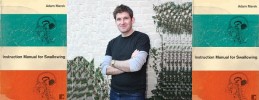
– what our stories deliver
In my previous blog post for Thresholds I wrote about the function of junctions and whether they make links or breaks in stories. I want to turn my attention now to what comes between them, to what I think of as packages.
The significant package in prose fiction, and especially in the short story I suspect, is the paragraph. Stephen King suggests this in his On Writing. Groups of paragraph packages are often separated by a line space.
These packages evoke responses in the reader. I’m interested in exploring the possibility that by changing the contents of the individual packages the story will be changed, even if the words themselves are left unchanged.
A happy accident alerted me to the benefit of looking at the issue of packages. In the Penguin 1963 anthology, Soviet Short Stories, I was reading Making Snowmen, by Yuri Nagibin, which, as all of the stories in the anthology are, was presented in parallel English and Russian texts. I was reading in English, but I soon noticed that the two versions, though both were split into sections by lines of white space, were split into different sections. Clues in the, to me, incomprehensible Russian text alerted me to the fact that these differences were not related to the relative number or length of words in the two languages, but to the fact that the translator had simply divided up the story differently. In fact, he hadn’t even created the same number of divisions.
It was a relatively simple matter to copy out the entire text, and to make another parallel reading, in English, but divided up as the Russian original was. I was now in a position to compare the two versions, which both had exactly the same words, in the same order, but with the emphatic white space junctions between their sections placed differently. [you’re thinking I should get out more, perhaps?]
Without going into the detail of this particular story, it seemed to me that the changes in the make up of the packages, and in the emphases of the new endings and beginnings they created, shifted the focus of the story. The translator’s story appeared to me to throw more weight on an exploration of the main protagonist’s inner emotional life, whereas the Russian original threw more on her relationship with the children she was in charge of.
The point is not to understand that story in particular however, but to ask if re-jigging the junctions, between paragraphs, or groups of paragraphs, would change the focus of any story, especially those we are engaged in writing. I think there are two ways it might do this. The first is by changing the content of the packages, by moving content from one package to another. The second is by drawing attention to different content, by making, or unmaking it the last or first element of a package.
Paragraphs themselves have junctions between them, which I have suggested may be in the nature of links or separators, but here it’s the contents of the packages I’m interested in. When I write, I instinctively make paragraph endings when something is changing (subject, point of view, ambience, location in time or space), but when I’m reading, I suspect that my attention is drawn to what begins and ends the paragraphs. The implication of this is that the paragraph beginnings draw attention to something that is being introduced, and their endings to something conclusive being said about it. The middles, in that scenario, would have a supporting role, with the important elements of the story being carried at the junctions, rather than within the packages themselves.
An exercise I have used is to give CW students a de-paragraphed story and to see what paragraph junctions, and line breaks they might choose to put in. It’s the discussion sparked by differences in their decisions, and by the rationales behind them, whether different or similar, that is the value of the exercise. I’ve appended a de-paragraphed story (chosen for its brevity rather than any other real or imagined merits), which you might like to ‘mess about with’ paragraphically speaking! The story was published in Pinhole Camera 3 (Cumbria University, 2007).
Of course, the effect of the process on this story is academic. What matters is whether or not you think the exercise has been worthwhile, that it might be a useful one to carry out on your own stories.
* * *
Doors
By Brindley Hallam Dennis
The doors were open when we awoke. The slam-to bang-up cell-doors. The clang-to slide-shut corridor doors. The metal-plate doors, the steel-bar doors, the mesh-grill doors. The sound- proofed padded-cell doors. They were all open. It was so quiet when they left. There was no shouting, no shattering glass, no splintering of wood, no screeching metal. They went like ghosts, along corridors, past steel bars, past the open doors, into the exercise yard, out through the main gates. If the guards had still been there, they would have screamed insults at each other. They would have thrown stones, bottles, small pieces of furniture. But of course, if the guards had still been there, the doors wouldn’t have been open. The desert was empty as far as the eye could see. The sky was hard blue. There were no clouds. The air was dry. Dust devils whirled, but inside the prison walls all was still. Not everyone went. Coney just sat on his bed, staring at the open door. Nobody had called to him to come out with them. The Doctor, high up on the third floor went to the end of the corridor, and turned back. The others went like children, eyes wide with wonder, heads tilted back, watching the high walls, watching the watch-towers, watching the hard blue sky. They forgot inside agendas, feuds, vendettas. Nobody thought about retribution or revenge. They were overawed by the simplicity of escape. They could not believe it. They dared not disbelieve it. They tiptoed out, as if, by making too much noise, they might awake sleeping memories of the absent guards, and be driven back into the cells. Outside they didn’t know which way to turn. There was no one to meet them: no wives or sweethearts: no sisters: no brothers. They fanned out from the gates. Some took the straight road, sticky in the sun. Others cut over the sand hills, through cacti and brushwood. I watched them go. I wondered what to do. I knew the guards would not be coming back. Oblongs of old sticky tape on the doors showed where they had taken the pinups from their lockers. After a while, after we had got used to the silence, we began to worry. At first we worried that they would return, the guards, but in our hearts we knew that they would not. Then we worried about being alone, but the well was full, and the gardens provided more than we needed with the others gone. Then we worried that they might return after all, the others. Then we worried that ones might come, who had been neither guards, nor inmates. That was when we decided to close the gates. We closed them at night to begin with, then during the heat of the day, while we slept in the shade. Then we closed them all the time, and only opened them to let ourselves out into the gardens. Then we worried about ourselves. Coney. The Doctor. Even me. Some of them worried even about me, wandering the empty corridors at night, or while they were in the fields. So we started to close the cell doors too. To begin with we closed them only at night, then during the heat of the day, and whenever we went outside to pick fruit or vegetables. Eventually we felt safer with them closed all the time, except when we were actually passing through them. That is, after all, the only time that you need a door to be open.


A propos…it struck me whilst reading Il Postino (Neruda), in a parallel text (another language I don’t have), that the translator was using different words at different times, in both directions, in his translations, which gave me some undiscovered facets that I hadn’t noticed before, of the words in my own language .
Thank you Mike – your article is very thought provoking. I too am struck by how much one little change can mean to a story. This summer I read a book of short stories that were in their original Italian along with their translated versions (I don’t have the book in front of me now. It is now 6:00am and I can’t sleep!) and was struck by the same differences. Through experience I know that an Italian word evokes different feelings in me; say the same word in English and it’s not the same. I’m working on a short story that takes place in Italy and recreating that experience for an American audience in mind has been tough. My intention is to go back, through the use of language, to the root of those experiences. I hope I didn’t veer too much off the mark!